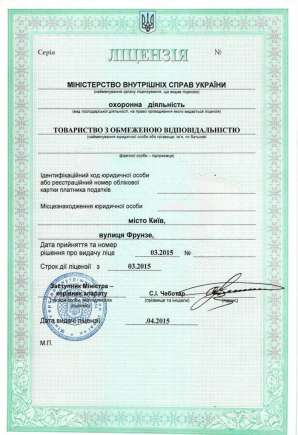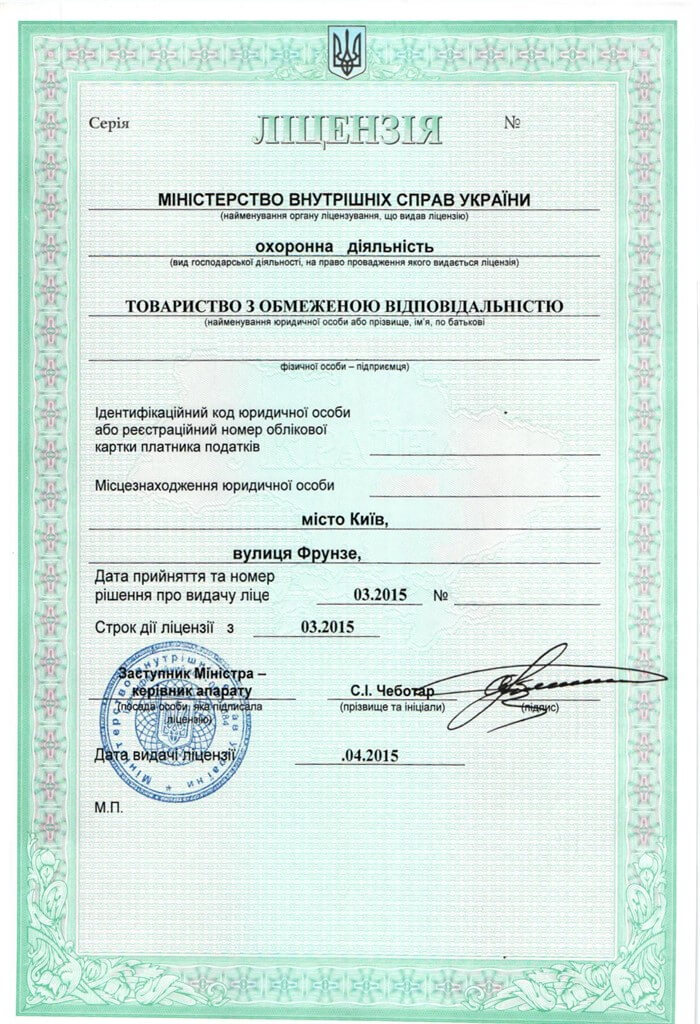When Should a Security Specialist Be Paid?
Cost of services:
Reviews of our Clients
Quick response forse "Tiger" LLC expresses gratitude to Law firm «Pravova dopomoga» for long-term cooperation, which brings only positive results.
The situation where representatives from the Ministry of Internal Affairs' Licensing Department contact security companies to inquire why a security specialist has not been paid is familiar to many. Our clients have faced such requests multiple times, and we have helped them properly address the issue.
These situations can arise for various reasons. For example, if the company has recently obtained a Security License but has not yet begun operations, the staff may not have received their salary. Alternatively, if the company is temporarily inactive and has placed employees on unpaid leave, this could be another reason. However, the Licensing Department insists that the security specialist must be officially employed and receive a salary. In some cases, claims may be made suggesting that the documents contain false information if the employee has not been officially hired.
But does the law actually require that a security specialist's salary be paid immediately? Are there grounds for accusations of providing false information? In this article, we will share our experience and explain:
- Does a security specialist need to be paid right after submitting the license application?
- How to properly arrange employment to avoid issues with regulatory authorities?
- What should companies planning to obtain a security license do? Is it necessary to officially employ a security specialist and pay their salary before receiving the license?
We know how to address this situation to ensure your company operates legally, without the risk of losing its license or facing other legal problems.
You might also like: The Most Frequently Asked Questions About Security Services
Who is a Security Service Provider and When Should a Security Specialist Be Paid?
According to clause 14 of the Licensing Conditions, a security service provider must have a security organization specialist on staff. However, let's refer to the Law of Ukraine on "Security Activities." Who exactly is a security service provider? According to Article 1 of this law, a security service provider is a company that conducts security activities based on a license obtained in the prescribed manner.
So, what does this mean? In practice, a security organization specialist should already be part of the staff of a security service provider that has received the license. However, under the same Licensing Conditions, when applying for a license, documents related to the specialist, including an employment contract, must be submitted.
A logical question arises: does this mean that the specialist should be paid before the license is issued? After all, they can only begin their duties once the company is authorized to conduct security activities.
When Should a Security Specialist's Salary Be Paid?
Based on the above, when submitting documents for a security license, the specialist is not required to receive a salary, and no social security contributions need to be paid on their behalf. The mere signing of an employment contract does not mean that the specialist starts working immediately.
The specific start date for their work, or the conditions under which they begin (for example, after receiving the license), should be clearly outlined in the employment contract. This is why it's important to carefully review this document. It's best to have specialists draft the contract rather than using a template from the internet, as doing so could lead to issues with regulatory authorities and create unwanted legal consequences.
If the salary does not need to be paid at the time of submitting the license documents, when does the obligation to pay arise? The obligation to pay salary starts from the moment the specialist actually begins performing their duties. This is formalized by an internal order that specifies the specialist’s start date.
One day prior to this, you must submit a notification to the tax authorities about the employee’s hire. After this, in accordance with the law, the salary for the security specialist will be accrued, and the unified social contribution will be paid.
Please note: if your security company has obtained a license but has not started operations even a year later, and the security specialist has not begun their duties, there is no obligation to pay them.
You might also like: Security Specialist: What Military Experience Qualifies for the Position?
What to Do If You Receive a Call from the Licensing Department of the Ministry of Internal Affairs?
If you receive a call from the Licensing Department of the Ministry of Internal Affairs asking why the security specialist has not been paid, you should respond confidently and rely on the law. Refer to the employment contract, which clearly states that the salary is to be paid starting from the actual date the employee begins their duties.
What should you do if representatives of the Licensing Department claim that you provided false information when applying for the license, which could lead to serious consequences, and urge you to file for the license’s revocation? In most cases, this is simply an intimidation tactic without legal grounds. Of course, this could become an issue if the employment contract does not specify that the salary begins from the date it is signed. That’s why employment agreements should be drafted by professional lawyers who are familiar with all legal nuances.
Ultimately, the issues of paying social security contributions and salary payments are regulated not by the Licensing Department but by the appropriate authorities, such as the tax service and the State Labor Service. So, if you’re confident that you’re in the right, don’t let such intimidation tactics affect you.
You might also like: Drafting Security Services Agreements: How to Create a Template
How We Can Help Solve This Issue
This situation is quite common. We often get inquiries from clients who have already encountered issues with security specialist payments. Some want to avoid risks during the document preparation phase, while others are already facing inspections and need legal protection.
We know exactly how to handle these cases because we’ve successfully resolved similar situations before. Our approach goes beyond simple legal consultations, we provide effective, actionable solutions:
- Analyzing the situation and offering a consultation that clarifies the next steps.
- Developing legally sound solutions to protect your business.
- Preparing documents that comply with legal requirements.
- Providing ongoing support and communication with licensing authorities.
Your case may seem complicated, but there is always a solution. And we know exactly what will work for you.
Submit a request for a consultation or contact us via the phone number on our website, and we will help you resolve your licensing and security-related issues quickly, efficiently, and reliably.
Our clients














